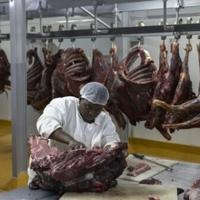Carcasses of impala, kudu, and wildebeest are displayed at a slaughterhouse in Bela Bela, north of Johannesburg, ready to be processed into steaks, sausages, and burger patties made from game meat. This site is one of the few in South Africa dedicated to game meat production.
The government believes that focusing on this untapped sector could create job opportunities, contribute to wildlife conservation efforts, and cater to the preferences of environmentally-conscious meat eaters.
Khorommbi Matibe, the environment ministry’s biodiversity economy chief, stated, “We want to introduce organic game meat from the wild to your plate as a new dining option.”
Despite being a top wildlife tourism destination, South Africa currently produces around 60,000 tons of game meat annually, with only a small fraction reaching commercial markets. The vast majority is informally hunted and consumed, with minimal amounts exported to overseas markets.
Authorities aim to significantly increase the production and consumption of game meat, as outlined in a strategy published recently. By 2036, they hope to grow the sector from a value of 4.6 billion rand in 2020 to 27.6 billion rand.
– Less methane –
Game meat is considered environmentally friendly due to lower methane emissions compared to traditional livestock like cattle. This meat is also leaner and free-range, offering a healthier protein option for consumers.
South Africa’s conservation efforts also benefit from an increased focus on game meat production. The country’s wildlife population has significantly grown over the years, largely due to a market-oriented approach that incentivizes farmers to care for wildlife sustainably while profiting from it.
Efforts are underway to promote increased black ownership in the game meat sector, improve quality standards, and enhance export potential. However, challenges such as limited testing facilities and stringent regulations hinder the sector’s growth potential.
– Big disappointment –
Despite challenges, stakeholders remain optimistic about the future of game meat production in South Africa. They believe that with the right strategies and support, the sector can thrive and contribute positively to the economy and wildlife conservation efforts.
ub/dc/ach/smw





